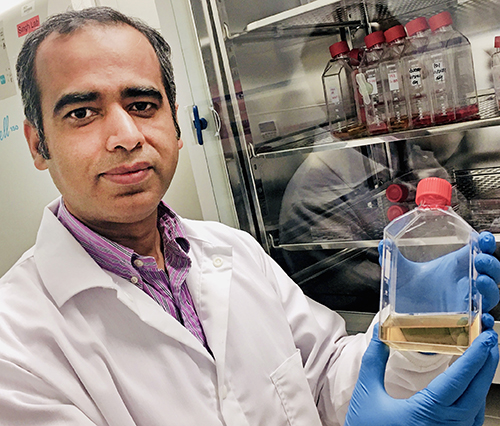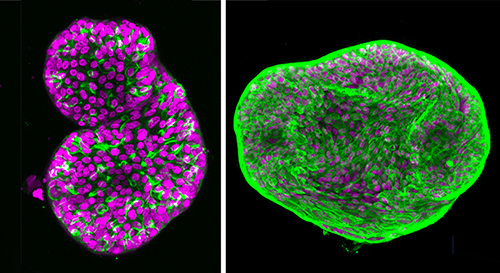Other personalized cancer diagnostics also may be improved by the method’s underlying concepts, says the team who developed the technology
Personalized treatments for prostate cancer may soon be more effective thanks to a multi-institutional team of scientists who claim their improvement to the development of organoid technology could lead to a precision medicine breakthrough in prostate cancer research.
These new findings, they say, will enable hospitals to access new tools in managing difficult-to-treat forms of prostate cancer that are not responsive to normal prostate cancer treatment. Hospitals modernizing their prostate cancer treatment options with precision medicine offerings could see better outcomes and enhance the reputation of their oncological offerings.
Going Beyond ‘Normal’ Treatment Methods
Researchers from Georgia Tech, Emory University, and Cornell University worked together to find new therapeutic treatment options for prostate cancers. The researchers primarily focused on prostate cancers that no longer respond to normal treatment methods.
About 80% of prostate cancers are androgen-dependent, requiring hormones to fuel and promote their growth. Patients with advanced prostate cancer often have the growth of their cancers slowed and their survival enhanced by using medications that block androgen, inhibiting the cancer’s source of growth.
The remaining 20% of patients, however, have prostate cancer that has progressed beyond the influence of androgen. For these patients, treatment is more difficult and often impossible.

The researchers published their findings in the journal Advanced Materials, titled, “Extracellular Matrix in Synthetic Hydrogel-Based Prostate Cancer Organoids Regulate Therapeutic Response to EZH2 and DRD2 Inhibitor.”
Growing Personalized Cancer Variant Models
Lacking a good model to study advanced prostate cancer, Singh and his team turned to a more recently developed tool—organoids. Organoids are three-dimensional cultures of tissue from a specific organ that can be used for in-depth in vitro experimentation.
While organoids provide an ideal method for studying organs at the cellular level, they also can be applied to cancers. Growing cancer organoids not only provides an ideal experimental model, but also empowers precision medicine advances by enabling the creation of organoids from a specific cancer variant. One key advantage to using organoids is that multiple treatment types can be experimented on without risking any harm to the patient.
Using organoid technology, the researchers identified a new protein, EZH2, that enhances tumor growth in hard-to-treat forms of prostate cancer. The research team found that inhibiting this protein slowed the growth of certain prostate cancers. To fully explore the benefits of EZH2 inhibitors, the team redesigned the extracellular matrix normally used when creating organoids to better evaluate potential treatments.
“EZH2 inhibitors may require high doses, and we are just beginning to understand factors that control EZH2 activity,” Singh said, adding that this treatment, while very helpful, might not be curative for everyone. “In some patients, EZH2 inhibitors may not eliminate the tumor in its entirety.”

Improved Precision Medicine Diagnostics for Cancer
Organoids offer not only a new precision medicine research method but also may lead to better precision medicine diagnostics.
In an interview with Technology Networks-Cell Science, molecular biologist Else Driehuis, PhD, said that by using organoids, “we can show that for a particular patient subset, for a particular drug, we can do better than the current selection criteria.”
Driehuis is a researcher with the Clevers Group at Hubrecht Institute and clinical molecular biologist in pathology in training at the University Medical Center Utrecht in the Netherlands. “That criteria may simply be a tumor type and stage in the clinic. Let’s say all patients with disease X in stage Y get radiotherapy as the standard of care. 40% of them will benefit, the others don’t. If, based on organoid screens we can get that number up, then implementing the use of organoids should be worth it,” she added.
While Singh’s team used organoid technology specifically for researching prostate cancer, he believes that the concepts their research developed could help improve other precision medicine cancer diagnostics.
“Not every patient’s tumor microenvironment is the same,” Singh noted. “We could take a biopsy sample, profile the patient’s microenvironment, take that specific information and create an organoid model that you can treat with drugs and develop a personalized treatment regime. Tailoring this towards precision oncology would be huge for us. That was the original idea. That’s the ultimate goal.”
The benefit that hospital and oncology leaders can derive from this recent research is twofold. First, the new therapeutic targets that have been discovered will enable hospitals to provide precision medicine therapies specifically for previously untreatable prostate cancers. Second, the underlying technology that made this research possible may provide hospitals with other improved precision medicine diagnostics in the near future.
Being aware of how organoid technology impacts precision medicine enables hospitals to be better serve their cancer patients.
—Caleb Williams
Related Information:
Prostate Cancer Organoids Open Path to Precision Oncology
How Organoids Are Fueling Infectious Disease Research and Personalized Medicine
